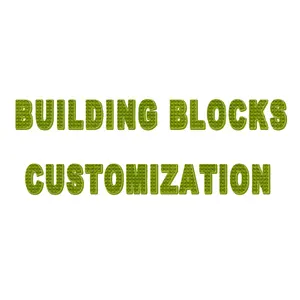Popular in your industry









































































































































Top categories
About dobie blocks
Introduction
In the world of construction, efficiency, durability, and cost-effectiveness are paramount. One innovation that encapsulates these qualities is the use of dobie blocks, also known as 'chairs'. These small concrete blocks, used to support and position rebar prior to a concrete pour, have revolutionized the construction industry. This comprehensive guide will delve into the origin, evolution, types, and uses of dobie blocks. It will also explore their impact on construction, their role in enhancing durability and strength, their ease of use, versatility, and their contribution to environmental sustainability. Finally, we will guide you on how to implement dobie blocks in your construction project, including planning, designing, construction techniques, safety measures, and some successful case studies.
Understanding Dobie Blocks
Dobie blocks, also known as 'chairs', are small concrete blocks used to support and position rebar prior to a concrete pour. They are essential for maintaining the correct placement of rebar, which strengthens the concrete structure. Dobies are available in various sizes to meet different height and placement requirements. A common size is 3” x 3” x 3”. They come with two 16-gauge wires embedded in them to secure rebar sticks or welded wire. This ensures the rebar's effectiveness in supporting the concrete in the right places.
The Origin and Evolution of Dobie Blocks
The term 'Dobies' has become synonymous with concrete rebar supports over the past fifty years. Initially, they were designed as On Grade Square Chair applications nearly thirty years ago. Over time, the range has expanded to include three plastic chair types: Square Chair, Tilt Chair, and Hi Chairs. These are typically used by general contractors in various concrete forming applications, including bridge decks.
Types and Uses of Dobie Blocks
Dobie blocks, also known as 'chairs', are small concrete blocks used to position rebar at the correct location prior to a concrete pour. They prevent rebar misplacement and hold the rebar at the required height, ensuring the concrete has the right support and strength. Dobies come in various sizes to meet different height and placement requirements. A common size is 3” x 3” x 3”. They are equipped with two 16-gauge wires to secure rebar sticks or welded wire. Dobies are a ready-to-use solution, providing a more intentional and professional approach to rebar placement.
The Impact of Dobie Blocks on Construction
Dobie blocks play a crucial role in construction, particularly in reinforcing concrete structures. They are used to position rebar at the correct location before a concrete pour, providing the necessary support and strength. Without these supports, the rebar could fall or get misplaced during the pour, rendering its strength ineffective. Dobie blocks, made from small concrete blocks, are a reliable solution to this problem. They come in various sizes to meet different requirements and are equipped with wires to secure the rebar or welded wire. This ensures the concrete's strength and durability in the right places.
Efficiency and Cost-Effectiveness
Dobie blocks, typically 2"X4" concrete blocks, are used to hold wire mesh and rebar off the ground during concrete pours. They are a cost-effective solution, especially when compared to alternatives like wire chairs. For instance, a DIY solution using 1&1/2" PVC pipe cut in 3&1/2" lengths with a slit down the side and some annealed tie wire embedded in the concrete costs just 6 cents a piece to make, significantly cheaper than wire chairs priced at 50 cents a piece. This not only makes dobie blocks efficient but also highly cost-effective for construction projects.
Enhanced Durability and Strength
Concrete alone lacks tensile strength, leading to inevitable cracks. To counter this, steel reinforcing bars, or rebar, are strategically placed before a concrete pour, creating a stronger unit known as 'reinforced concrete'. Proper placement of rebar is crucial for optimal support and strength. Dobie blocks, small concrete blocks, are used to hold the rebar at the required height, preventing misplacement during the pour. This ensures the rebar effectively strengthens the concrete in the right places, enhancing the durability and strength of the construction.
Ease of Use and Versatility
Dobie blocks are incredibly versatile and easy to use in construction projects. They are available in multiple sizes to meet various height and placement requirements. A common size is 3” x 3” x 3”. To prevent rebar misplacement and hold the rebar at the required height, two 16-guage wires embedded in the dobies can secure rebar sticks or welded wire. The dobies come in rows of 6 which are easily broken apart along scored lines for individual dobie placement. This makes them a practical and efficient solution for reinforcing concrete structures.
Environmental Sustainability
A new project by a leading architectural firm, in collaboration with a renowned materials company, presents an environmentally friendly alternative to traditional construction materials. They've developed Bio-Blocks, made from naturally occurring micro-algae that sequesters carbon. This process creates a net zero-carbon building material with similar or improved physical and thermal performance properties compared to standard concrete. By replacing concrete blocks with Bio-Blocks, carbon emissions can be significantly reduced. This innovation could revolutionize the construction industry, offering a sustainable alternative to traditional materials.
Implementing Dobie Blocks in Your Construction Project
To implement dobie blocks in your construction project, it's crucial to position the rebar at the right location before the concrete pour. Dobie blocks, often used as supports, ensure the rebar stays in place, preventing misplacement during the pour. These blocks come in rows of six, easily broken apart for individual placement. They're equipped with two 16-gauge wires to secure rebar sticks or welded wire, ensuring the required height and placement. Contact your supplier to schedule your delivery of dobie blocks for your concrete project.
Planning and Designing with Dobie Blocks
Planning and designing with Dobie Blocks is crucial for a successful construction project. Dobie Blocks are used to position the rebar at the proper location prior to the concrete pour. These supports, also known as 'chairs', are made from a small concrete block called a 'dobie'. Dobies come in various sizes to meet different height and placement requirements. A common size is 3” x 3” x 3”. Two 16-gauge wires embedded in the dobies secure rebar sticks or welded wire, preventing rebar misplacement and holding the rebar at the required height.
Construction Techniques and Best Practices
To ensure the proper placement of rebar within concrete, professionals use supports known as 'chairs' or 'dobie blocks'. Dobies, typically 3” x 3” x 3” in size, are small concrete blocks that prevent rebar misplacement and hold the rebar at the required height. Two 16-gauge wires embedded in the dobies secure rebar sticks or welded wire. This technique ensures the rebar strength is effective in supporting the concrete in the right places, enhancing the overall durability and strength of the construction project.
Safety Measures and Guidelines
When cutting dobie blocks, safety is paramount. Essential personal protective equipment (PPE) includes safety glasses, hearing protection, and a respirator. Wet cutting is recommended to minimize airborne dust. Ensure your saw and diamond blade are in good condition before starting. Never rush a cut; patience ensures a smoother, safer cut. Always adhere to regional and legal safety standards. Prior to cutting, communicate potential risks and safety measures to your team. Remember, a safe worksite is a productive worksite.
Case Studies: Success Stories with Dobie Blocks
In a residential construction project, the homeowner appreciated the use of dobie blocks. They initially thought the broken bricks and chunks of block thrown in the construction site were a cheap way to dispose of construction waste. However, they later realized the importance of these materials in providing a solid foundation. The use of dobie blocks in this project not only enhanced the structural integrity but also proved to be a cost-effective solution. This case demonstrates the practical application and benefits of dobie blocks in construction.
Residential Construction Projects
In a residential construction project, the use of dobie blocks proved to be beneficial. The homeowner, who had his garage enclosed and enlarged, observed the builders using broken bricks and chunks of block in the construction process. Initially, he thought it was a cheap way to dispose of construction waste. However, he later realized that these were dobie blocks, a cost-effective and efficient solution for reinforcing concrete structures. This practice enhanced the strength and durability of his garage, demonstrating the practical application of dobie blocks in residential construction.
Commercial Construction Projects
Commercial construction projects often demand robust and reliable materials. Dobie blocks, known for their strength, have been a game-changer in this sector. We've re-engineered our bolsters, sparing no expense, to meet the demands of the toughest commercial projects. Available in both boxes or pre-assembled in 10’ lengths, these super strong slab bolsters have had incredible success. Although we currently do not manufacture a lightweight-use bolster, our focus is on providing a product that can withstand the rigors of commercial construction. These bolsters are available with or without staple down legs.
Infrastructure and Public Works
Infrastructure and public works projects also benefit from the use of dobie blocks. These projects often require robust and durable materials to withstand the rigors of large-scale construction. Dobie blocks, with their strength and versatility, have proven to be an invaluable resource in these settings. They ensure the correct placement of rebar, enhancing the strength and durability of concrete structures, making them an indispensable tool in infrastructure and public works projects.
Conclusion
Dobie blocks have proven to be a game-changer in the construction industry. Their role in ensuring the correct placement of rebar, enhancing the strength and durability of concrete structures, and their cost-effectiveness make them an indispensable tool in construction. They offer versatility in their use and contribute to environmental sustainability, as seen in the development of Bio-Blocks. Implementing dobie blocks in your construction project requires careful planning, designing, and adherence to safety measures. As demonstrated in the case studies, their practical application in residential and commercial construction projects has yielded successful results. In conclusion, dobie blocks are revolutionizing construction projects, making them more efficient, durable, and cost-effective.





















